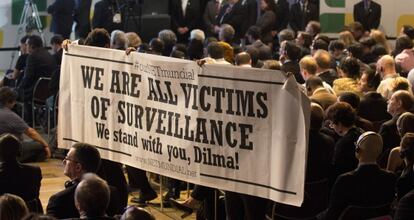‘Net neutrality’ gets left out of Brazil online governance summit
Emerging powers fail to change status quo over control of internet communications


The sacred concept of ‘net neutrality’ does not appear in the final document produced by NETmundial, a two-day global summit on the future of internet governance held in Brazil.
The gathering of 800 representatives from 85 countries agreed to condemn “massive surveillance” on the internet and called for legal action against it in accordance with international legislation. But despite this reference to the Edward Snowden scandal, the final document makes no mention of the US National Security Agency, which operated a huge surveillance program that targeted allied governments, private companies and individuals, including Brazilian President Dilma Rousseff.
The battle over whether or not to include the concept of net neutrality – the idea that all internet services should enjoy the same access and speed, without discrimination on the basis of content or user – blocked consensus over the final drafting of the São Paulo Declaration.
In the end, the 10-page document is but a pale reflection of what many had hopefully looked to as a historic summit, held in a country that has just approved the first ever Internet Constitution.
We can’t understand what criteria were used in the drafting of the document”
The debate took place just 24 hours after the Federal Communications Commission (FCC), the internet regulator in the US, announced what many take to be permission for broadband providers to offer preferential service to specific, premium-paying companies. Divergent opinions from the representatives of Brazil, the US and the European Union prevented a more ambitious text from being approved.
In statements to the press, Paulo Bernardo, Brazil’s communications minister, admitted to these differences of opinion and said he trusted that net neutrality would be achieved at a later date.
“Some countries do not want it. The United States does not. Neither does the European Union,” he said.
For experts such as Sergio Amadeu, a sociologist who has helped draft related legislation, the recently ended summit represents a major victory for the big telecommunications firms (phone and cable operators) over internet companies such as Google, Facebook and Twitter.
“The whole thing is absurd,” said Amadeu. “The telecoms lobbies were dominant and they applied pressure during the final debates; they managed to weaken the text and take the word neutrality out of the final wording. No measures are established to combat massive surveillance, either, since the large companies will continue to control traffic.”
Representatives from Cuba, India and Russia (whose president Vladimir Putin recently described the internet as a CIA tool) expressed disagreement with the final document: “The decisions were made by a predetermined committee and we can’t understand what criteria were used in the drafting of the document. Our contributions were ignored, and the only thing this will do is foment inequality between countries.”
The São Paulo summit was trying to achieve what the last International Telecommunications Union meeting failed to secure: an agreement between countries defending the status quo and emerging powers such as China, Russia and India, who also want some control over internet governance.
Tu suscripción se está usando en otro dispositivo
¿Quieres añadir otro usuario a tu suscripción?
Si continúas leyendo en este dispositivo, no se podrá leer en el otro.
FlechaTu suscripción se está usando en otro dispositivo y solo puedes acceder a EL PAÍS desde un dispositivo a la vez.
Si quieres compartir tu cuenta, cambia tu suscripción a la modalidad Premium, así podrás añadir otro usuario. Cada uno accederá con su propia cuenta de email, lo que os permitirá personalizar vuestra experiencia en EL PAÍS.
¿Tienes una suscripción de empresa? Accede aquí para contratar más cuentas.
En el caso de no saber quién está usando tu cuenta, te recomendamos cambiar tu contraseña aquí.
Si decides continuar compartiendo tu cuenta, este mensaje se mostrará en tu dispositivo y en el de la otra persona que está usando tu cuenta de forma indefinida, afectando a tu experiencia de lectura. Puedes consultar aquí los términos y condiciones de la suscripción digital.








































